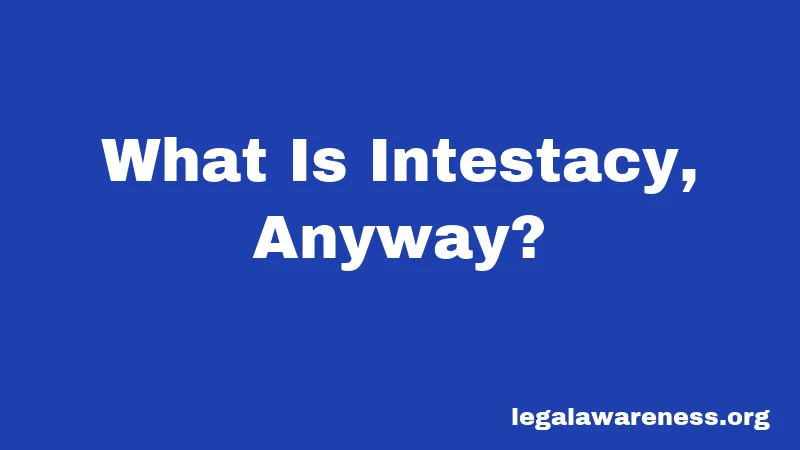Pennsylvania Intestacy Laws (2026): When The State Decides Your Estate
Here’s something most people don’t think about. What happens to your stuff if you die without a will? Honestly, it’s more important than you’d think. In Pennsylvania, the state has very specific rules about who gets what.
You’re probably thinking: “Does the government take everything?” Nope. But Pennsylvania does get to decide who inherits your property. And that decision might not match what you’d actually want.
What Is Intestacy, Anyway?

So what’s intestacy? It’s just a fancy word for dying without a will. When you pass away without one, Pennsylvania law steps in automatically. The state’s intestate succession laws take over and distribute your stuff to your relatives.
Think of it like this. You didn’t tell the state who should get your money and property. So the state guesses based on your family relationships. The closer you are to someone by blood or marriage, the more they inherit.
This matters because the default rules might not be what you’d choose. Your ex-spouse could get something. A distant cousin might get money. A friend who meant everything to you? They get nothing.
The Basic Rules: Who Gets What?
Got a spouse but no kids? Your spouse gets everything. Pretty straightforward.
But here’s where things get a little more complicated. If you have both a spouse and children, Pennsylvania splits your estate. Your spouse gets the first $30,000 plus half of what’s left. Your kids split the other half equally. Make sense?
Not sure how this applies to your situation? Let me break down each scenario.
When You Have a Spouse and Children

This is super common. You’re married with kids. So what happens to your estate?
Your surviving spouse receives the first $30,000 of your estate. Then they get half of everything else. Your children divide the remaining half equally among themselves. If you have three kids, each one gets one-sixth of the remaining balance.
Here’s an important detail though. This split only works if all your children are also your spouse’s biological or legally adopted children. If you have a child from a previous relationship, the rules change.
What if one of your kids already died? No problem. That child’s share goes to their own children (your grandchildren). They inherit their parent’s portion.
When You Have a Spouse But No Children
This is actually the best-case scenario for your spouse. If you have no kids, no parents, and no siblings still alive, your spouse gets everything. The entire estate.
But let’s say you have living parents. Then your spouse only gets the first $30,000 plus half the remaining estate. Your parents get the other half. That might surprise you, right?
And what if you have a surviving sibling but no parents? Your spouse still gets the first $30,000 plus half the balance. Your sibling gets the other half. The law really tries to spread things around.
What If You Have No Spouse?

Okay, pause here. This changes everything.
If you’re unmarried when you die, your entire estate goes to your descendants. Your children inherit equal shares. If you have no children, it moves to your parents. No parents? Then it goes to your siblings.
The law keeps working backwards through family relationships until it finds someone. Your nieces, nephews, aunts, uncles, and cousins all have a shot, in that order.
This is one place where Pennsylvania tries really hard to prevent the state from taking your property. Seriously, the state only gets your money if you have zero living relatives. And that almost never happens.
The Five-Day Survival Rule
Here’s something people rarely know about. To inherit from you, someone has to survive you by at least five days.
Why does this matter? Imagine you and your brother are in an accident. You die immediately. He dies four days later in the hospital. His estate wouldn’t get any of your property. He didn’t survive you long enough under Pennsylvania law.
This rule prevents weird situations where someone dies right after getting your money, and then the estate splits gets messy.
Children Born Outside of Marriage: What Counts?
So you had a child with someone you weren’t married to. Will that child inherit from you?
Yes, if one of three things is true. First, you and the child’s mother could have married later. Second, you might have publicly claimed the child and supported them financially. Third, your paternity was proven under Pennsylvania law.
This changed in 2024 with Act 40. The law now makes it clearer how paternity gets established for inheritance purposes. If you’re in this situation, it matters. You’ll want solid documentation.
Children you legally adopted? They inherit just like biological children. Foster children or stepchildren you never formally adopted? They don’t inherit unless you have a will that says otherwise.
What About Grandchildren?
Here’s how this works. Grandchildren only inherit if their parent (your child) died before you. It’s called “representation.” Your grandchild steps into their parent’s shoes and gets that share.
Think about it this way. You have two kids. One is still alive. One died before you did. The living child gets their full share. The dead child’s share goes to their kids (your grandchildren), who split it equally.
This prevents grandchildren from cutting out their parents. If your child is alive, they get the money. Your grandchildren can’t jump ahead in line.
Half-Relatives Count as Whole Relatives
Here’s something interesting. Your half-sister inherits the same as your full sister would.
Let’s say you share a mother but different fathers. Or you share a father but different mothers. In Pennsylvania, they’re treated identically for inheritance purposes. Half-siblings, half-aunts, half-cousins—they all count as whole relatives.
This used to be different in some states, but Pennsylvania’s pretty clear on this one. The blood tie is what matters, whether you share one parent or two.
What About Assets That Don’t Go Through Probate?
Okay, here’s the really important part. Not everything is affected by intestacy laws.
Life insurance with a named beneficiary? That goes to whoever you named, no matter what intestacy says. Same with retirement accounts like 401(k)s or IRAs. Bank accounts marked “payable on death”? Those go to the person you designated.
Real estate held as “joint tenants with right of survivorship”? The surviving owner gets it automatically. Trusts? Property in a trust follows the trust’s rules, not intestacy.
Only assets that go through probate are affected. These are usually things titled in just your name with no special instructions. Bank accounts without beneficiary designations. Real estate held solely in your name. A car registered just to you.
The rest passes directly to beneficiaries you named. The intestacy laws can’t touch it.
Recent Changes: Pennsylvania Act 40 (2024)
Pennsylvania updated some intestacy rules starting in July 2024. The changes mainly affect how elder abuse situations are handled. If someone’s convicted of abusing an elderly person, they can’t inherit from that victim’s estate.
This is a pretty big deal actually. It protects vulnerable older adults from predatory family members. If you think this applies to your situation, definitely talk to a lawyer.
What Happens If No Relatives Exist?
This is super rare. But if you have zero living relatives—no spouse, no kids, no parents, no siblings, no cousins, nobody—your estate goes to the Commonwealth of Pennsylvania.
The state basically gets your money. Is this actually likely? Almost never. Pennsylvania law tries really hard to prevent this. The state goes down an incredibly long list of relatives before giving up.
If you want to avoid this, you need a will. Even a simple one. Or you could leave instructions in a living trust. But doing nothing is risky if you have significant assets.
How Intestacy Works With Wills
Can you partially override intestacy? Actually, yes. You can write a will that contradicts it.
Your will controls property you specifically mention. If you name your best friend as executor but have no relatives, your friend doesn’t inherit your money. But they do control the estate distribution. The money still goes to relatives under intestacy rules.
You can also write a will that specifically excludes someone from inheriting. Your sibling won’t get anything if your will explicitly says so. But you can’t typically exclude your spouse completely. Pennsylvania law protects spouses with an “elective share” right.
The Elective Share: Protecting Spouses
Here’s something interesting. Your spouse can choose the elective share instead of what your will says.
If your will leaves them very little, your spouse can elect to take one-third of your “augmented estate.” This includes not just probate property but also some non-probate assets like joint bank accounts and certain trusts.
So write a will that gives your spouse $10,000 when you have $300,000? They could reject that and take one-third of everything instead. It’s a protection Pennsylvania built in.
Who Administers the Estate?
Someone has to actually manage all this. That person is called a “Personal Representative” or “administrator.”
If you died with a will, they’re called an executor or executrix. Without a will? They’re an administrator or administratrix. Either way, they collect your property, pay your bills, handle taxes, and eventually distribute what’s left.
Who becomes administrator? Usually, the court appoints a close relative. Spouses are first. Then adult children. Then parents. Then siblings.
The administrator has to get letters of administration from the Register of Wills in your county. These are basically proof they have the legal right to handle your estate.
The Probate Process: What Actually Happens
Okay, so you die. No will. What’s the actual process?
First, someone (usually a family member) goes to the Register of Wills’ office in your county. They file paperwork saying you died without a will and ask to become administrator.
The Register of Wills posts a legal notice. Creditors get a certain amount of time to file claims against your estate. You want to pay real debts. But you also have to reject obviously bad claims.
Next comes collecting property and paying obligations. The administrator gathers your assets. They pay your final medical bills, property taxes, and funeral expenses. They file final income tax returns.
Finally, they distribute what’s left according to intestacy laws. Everyone gets their share. The estate closes.
This can take six months to over a year depending on complications.
Unwilling Heirs: Can You Say No?
What if you inherit but don’t want the money? You can actually refuse it.
This is called a “disclaimer.” You file legal paperwork renouncing your inheritance. Your share then passes to the next person in line, as if you had died.
Why would you do this? Maybe you’re well off and your sibling needs it more. Maybe accepting the inheritance would trigger huge tax issues. Maybe you just don’t want complicated family drama.
But you have to disclaim within nine months of the person’s death. And you have to do it properly with lawyers. Just verbally saying no doesn’t count.
What Happens in Blended Family Situations?
This is getting more common. You’re married to someone. You have kids from previous relationships. Everyone dies in an accident.
Here’s how intestacy handles it. Your spouse gets their share. Your biological children get theirs. Stepchildren you never legally adopted? They get nothing from your estate under intestacy law.
If this bothers you, make a will. You can leave money to stepchildren. You can give them more than intestacy would. But without a will, only biological or legally adopted kids inherit.
Quick Question: Does Marriage Change Intestacy?
Yes, absolutely. Getting married is huge for intestacy law.
A single person with no will? Their parents might inherit. Once they marry, their spouse becomes first priority. The spouse overrides the parents almost completely.
Getting divorced? Your ex-spouse loses all rights to your estate. They’re treated like a stranger for inheritance purposes. This is one area where Pennsylvania is very clear.
What If You Move to Pennsylvania From Another State?
Here’s something people wonder about. You lived in California, made a will there, then moved to Pennsylvania. Does Pennsylvania’s intestacy law apply?
The answer depends on the situation. If you die with a will that was valid where you made it, Pennsylvania usually honors it. But if you die without a will, Pennsylvania law applies to property you own here.
Property you had in other states? That state’s laws might apply to that property. It gets complicated. This is where lawyers actually earn their money.
The Role of the Register of Wills
Pennsylvania has county Register of Wills offices. These people are super important for intestacy.
The Register of Wills is where you file all paperwork when someone dies without a will. They oversee the administration process. They make sure the administrator follows the law. They handle legal notices to creditors.
You find the Register of Wills in your county courthouse. They’re government employees, and they help families navigate this process. They’re useful people to know in this situation.
Can You Plan to Avoid Intestacy?
Honestly, yes. There are several ways.
The simplest is writing a will. Even a basic will beats intestacy law because you get to decide. You could name a best friend to get your house. You could leave money to a charity.
You could also make a living trust. Property in a trust doesn’t go through intestacy at all. It transfers privately according to your trust document.
Or just name beneficiaries on your major assets. Life insurance, retirement accounts, bank accounts. These don’t need a will. They automatically go where you want.
The point is this. Pennsylvania’s intestacy law isn’t a death sentence. It’s a fallback if you don’t plan. Planning takes maybe an hour and a little bit of money. It’s worth doing.
Frequently Asked Questions
What’s the difference between dying “intestate” and “insolvent”?
Good question. Dying intestate means no will. Dying insolvent means the estate has more debts than assets. You could be both. These are totally separate legal concepts.
Do I need a lawyer to handle intestacy?
Not always, but it helps. Simple estates with clear heirs? You might manage it yourselves. Complex estates with multiple properties? Get a lawyer. They cost money, but they prevent costly mistakes.
How long does the intestacy process take?
Usually six months to a year. It depends on how complicated your property is and whether anyone fights about inheritance. Simple cases go faster.
Can creditors still collect from an intestate estate?
Yes. The administrator pays legitimate debts before distributing assets to heirs. Creditors get notice and have a chance to file claims.
Does Pennsylvania allow representation by grandchildren?
Yes, absolutely. If your child died before you did, your grandchildren inherit their parent’s share. They “represent” their deceased parent.
Final Thoughts
Here’s the bottom line. Pennsylvania’s intestacy laws aren’t evil. They’re actually pretty thoughtful. They try to get your money to your closest relatives in a fair way.
But “pretty thoughtful” isn’t the same as “exactly what you’d want.” And that’s the problem.
You probably have preferences. You probably want specific people to get specific things. You might want to exclude someone. You might want to include a friend or charity.
Intestacy can’t do any of that. It just follows the formula.
The good news? You’re in control. Write a will. Make a trust. Name beneficiaries. It takes minimal effort and costs way less than fighting about an estate later.
Stay informed. Stay organized. And honestly, talk to a lawyer if your situation is complicated. It’s worth it.
References
- Pennsylvania Consolidated Statutes Title 20, Chapter 21 (Intestate Succession) – Official Pennsylvania intestacy law
- Pennsylvania Register of Wills Directory – Find your county Register of Wills office
- Nolo: Pennsylvania Intestate Succession Guide – Comprehensive overview of PA intestacy rules
- Pennsylvania Justice System: Probate and Estate Administration – Official Pennsylvania courts information
- RGS&G Law: Pennsylvania Intestacy Laws Explained – Updated 2025 legal guidance
